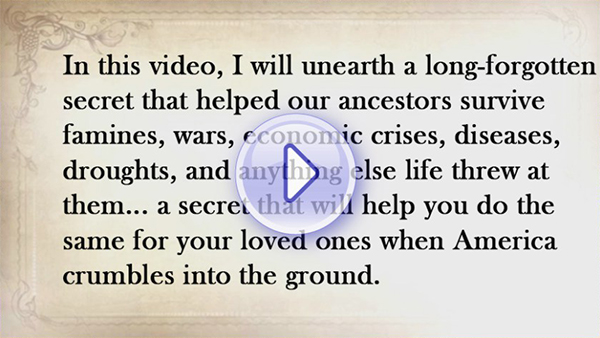Much of what is written about survival assumes a wilderness survival situation. There are several advantages to trying to survive in the wild, mostly that of not having to worry about all the other people around you.
On top of that, you have the availability of all the resources that nature provides for you.
On the other hand, when trying to survive in an urban situation, you have the exact opposite; basically no natural resources as well as a lot of other people around you who are vying for those same resources.
Nevertheless, urban survival is the situation which most of us are likely to find ourselves in. Being able to trap a squirrel in a snare or building a debris shelter in the woods may not be as important as some other skills we’ll need; especially if we’re trying to survive a financial collapse.
While some survival skills, like purifying water and starting a fire are universal, there are many other skills which are critical for an urban survival situation. Many of those skills affect how we deal with the other people around us, specifically protecting ourselves and our families from them. There are also some skills which are specific to a financial collapse, which may not be as important in the aftermath of other disasters.
We’re not going to bother looking at universal survival skills here, but rather those which are specific to surviving in an urban survival situation.
- Self-defense – The most dangerous predators on the face of the earth are the two-legged ones. In any crisis situation, you can be sure that they will be out in force; especially since they will probably not have made the necessary preparations to be able to take care of themselves. When they can’t find food for their families, they will become desperate and go into predator mode.
- Bartering – While most people won’t have stockpiled supplies for the emergency, everyone will have something. The ability to barter, making sure that you can get a good deal for your trade goods is a valuable skill; especially when you consider that the people you will be bartering with will be stressed by the situation.
- Gardening – It seems that food is always in shortage in a crisis situation. Having the ability to grow at least some of your own will help take care of your family. You can start a vegetable garden anywhere, even if you live in an apartment. Vertical gardening makes it possible to grow a very productive garden on the balcony of an apartment.
- Adaptability – Any crisis requires doing things that we aren’t accustomed to. Being adaptable makes it easier to adjust to those changes comfortably. One important area of adaptability in a financial collapse is the ability to find cheaper ways of doing things, so that you can make your money go farther.
- Teaching – Regardless of what type of crisis strikes, your children still need to be educated. The local schools might close down or it might become dangerous to take your children there. If either of those happens, you may have to suddenly start home schooling. The ability to teach your own children can make a huge difference in their future.
- Medical skills – Medical services are always overrun during a crisis. At times, just getting basic services can be very difficult. Proper first aid, as well as knowing how to treat common ailments can save your family from a lot of problems and may even save someone’s life. While selling these skills could be dangerous from a legal point of view, saving a neighbor’s life is a sure way of making them indebted to you.
- Repairing equipment – We have become a disposable society, in which we are accustomed to throwing things away and buying another, rather than repairing things so that we can continue using them. However, those new items may not be available; and even they are, you may not have the funds to buy them. Being able to fix things yourself can save a lot of money. This is also a marketable skill that you might be able to use to support yourself during the crisis.
- Emergency home repair – Many types of disasters can cause damage to your home, especially weather disasters such as hurricanes. The ability to repair your home may make it possible for your family to stay in your home, even while others are forced to vacate theirs. At the same time, this is another marketable skill, which you can use to support your family after the crisis, if you are unable to depend upon your normal job.
Always remember that the more skills you have, the greater a possibility you have of surviving. Those additional skills also provide you with more opportunities to find work during a financial crisis.
Many jobs will simply disappear during such a time, so the more skills you have, the more chances you have of finding a job or starting your own business.
Read also: 15 Skills That Will Make You Priceless In A Post SHTF Barter World
Saving our forefathers ways starts with people like you and me actually relearning these skills and putting them to use to live better lives through good times and bad. Our answers on these lost skills comes straight from the source, from old forgotten classic books written by past generations, and from first hand witness accounts from the past few hundred years. Aside from a precious few who have gone out of their way to learn basic survival skills, most of us today would be utterly hopeless if we were plopped in the middle of a forest or jungle and suddenly forced to fend for ourselves using only the resources around us. To our ancient ancestors, we’d appear as helpless as babies. In short, our ancestors lived more simply than most people today are willing to live and that is why they survived with no grocery store, no cheap oil, no cars, no electricity, and no running water. Just like our forefathers used to do, The Lost Ways Book teaches you how you can survive in the worst-case scenario with the minimum resources available. It comes as a step-by-step guide accompanied by pictures and teaches you how to use basic ingredients to make super-food for your loved ones. Watch the video below:
If you found this article useful, please like our Facebook page and stay up to date with the latest articles.
Source: survivopedia.com
This article has been written by Bill White for Survivopedia.


